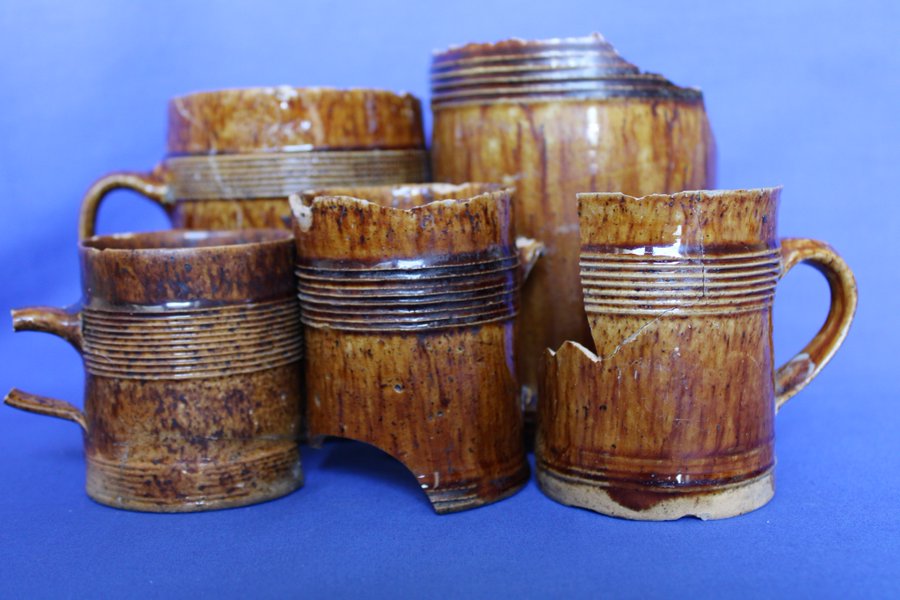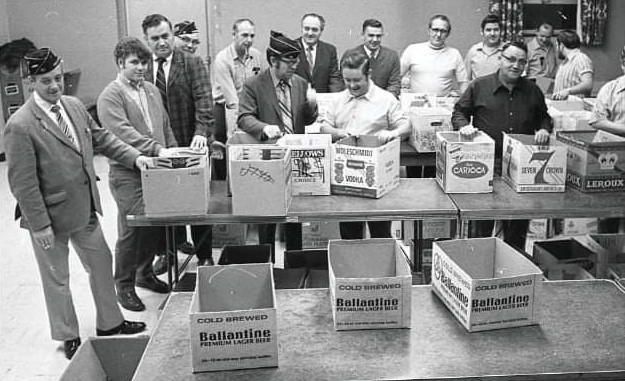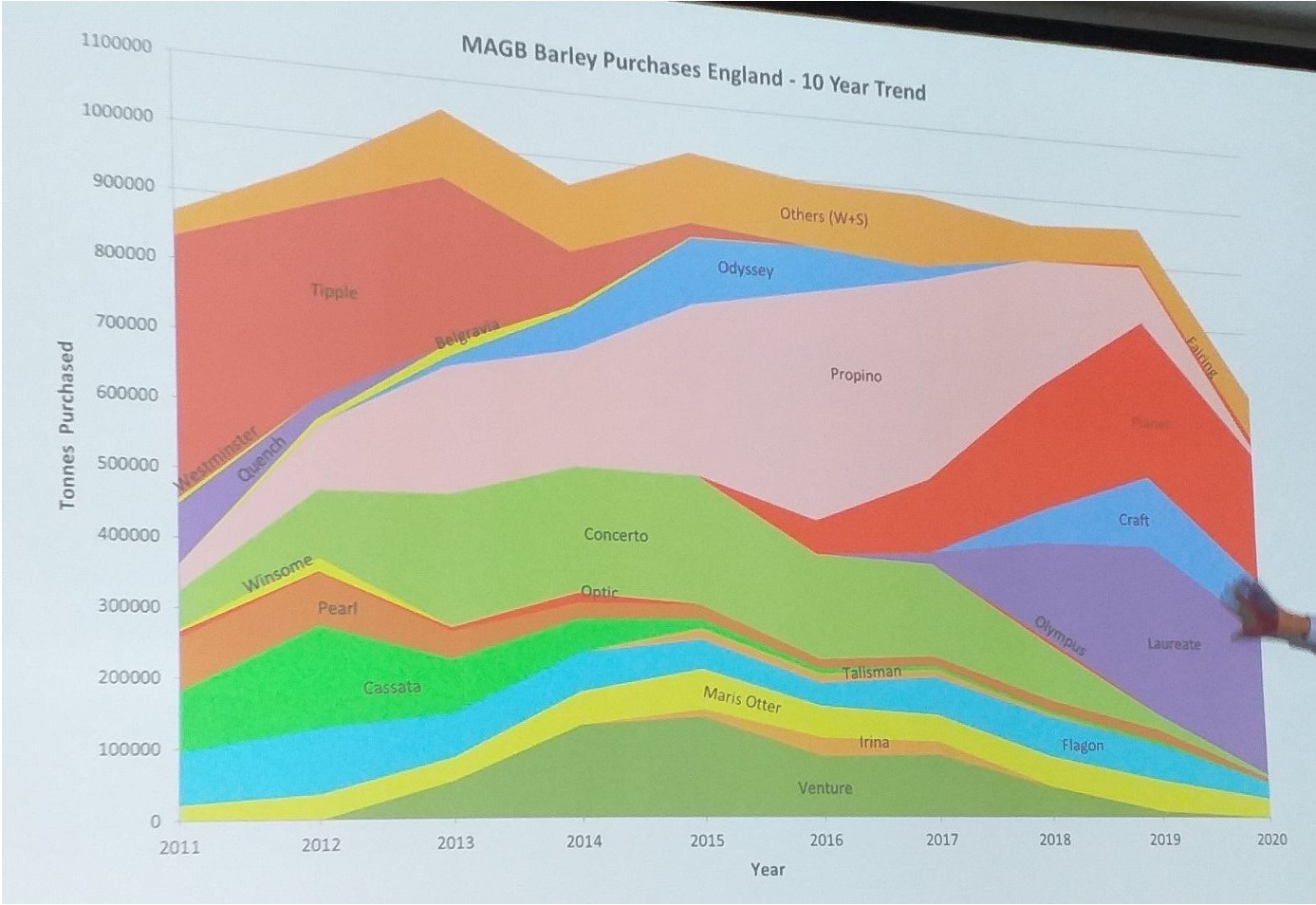Thaws. They deceive in February. Being unwise, I have started seeds. Thaws also jack the walkway tiles and bricks outside, too. Spent lunch Wednesday discovering the front step tiles are stuck on with stuff that’s now the consistency of chocolate pudding. So things are getting loose, a bit cracked and sorta smashed. But not quite as badly as these late 1600s and early 1700s manganese mottled tankards from Ireland posted on the internets this week. From Newmarket in Dublin we are told. Others have showed up in the colonies, in Maryland and at Harvard Yard. Lovely things. But most won’t hold beer.
Mid-morning Update: Jordan decided to post an homage to Toronto’s Godspeed and its pitch-lined Sklepnik project – posted at 2 am Thursday morning I would add, well past the time this weekly normally goes to press. But it is not worth waiting around another seven days to bring it to your attention:
Every piece is as important as every other piece. Not everything that Godspeed has done has been a triumph, and the situation has been challenging. It was the potential that excited people, and the pitch-lined Sklepnik represents years of earnest effort, not just in the brewhouse, but interpersonally. A month spent learning from people who have spent their entire careers on a single style, and whose trust creates possibility. Functionally speaking, the odds against its existence are such that it is construable as a miracle, and that’s before the first sip. The only way you can get here is trial and error. There’s no ironic posture as a brewer. It’s not a hobby. The secret ingredient is your life.
Also lovely. Now, back to our normal broadcasting…
 Unlike our man in The Netherlands (when he’s not in transit.) And, while we are speaking of lovely, Ron, who, yes, often holds a beer, has posted an image of a 1930s ad for Barclay Perkins lager along with his discussion of their 1941 brewing techniques:
Unlike our man in The Netherlands (when he’s not in transit.) And, while we are speaking of lovely, Ron, who, yes, often holds a beer, has posted an image of a 1930s ad for Barclay Perkins lager along with his discussion of their 1941 brewing techniques:
Good news for me, as it gives me a chance to preview (use a recipe I’ve already written) a recipe from “Blitzkrieg!”. Though for any of the four options I could have found a recipe in the book. For a book about UK brewing in WW II, it has quite a lot of Lager recipes. 37 in all. Though there are well over 500 recipes in total. Not that huge a percentage, really. Lucky old Dark Lager has seen its gravity increase by 0.5º compared with the previous year.
Elsewhere and also with increasing gravity, the continuing concerns that Guinness has or has not slipped under the radar and ended up in first place somehow in the UK diet… continue. A call for anecdotal evidence was sent out by B to the B and a summary was posted earlier this week. There was a whole lotta comfort out there as far as I could tell. My thoughts?
Had one two weeks ago in an unfamiliar pub in Toronto. Old reliable friend, tasty with most pub food, creamy savoury with the tang and the roast – and not an alcohol bomb. Might have one or two a year.
It’s all good. Sure it’s made by a faceless international conglomerate. But so is vestigially produced Fat Tire – both the new phony and old – and at least Guinness doesn’t buddy up with Myanmar‘s murderous dictators! And at least it’s actually something not made on the same equipment as automotive window washer fluid. By the way… I don’t understand. Aren’t hard soda and boozy seltzers the same thing? I suppose it doen’t help that I don’t give a crap about this… crap. But I have no idea. Thankfully.
Note: not one craft buzzword bingo square was left undaubed in the making of this story.
Beth Demmon released another issue of Probitchin’, this month featuring the work and career path of Jacque Irizarry:
Her interest in art coalesced during college, after she realized how many years of (expensive) education it would take to become a lawyer. After switching her track from becoming an early childhood education art teacher to visual art, she dabbled in photography and painting before graduating with an art degree. With student loans looming, she worked in customer service before landing her current full-time position handling the graphics and design for a company involved in online education, where she’s been for eight years.
Beth’s newsletter is one of my favorites in the beer world. There is a lot to be said for good writing that avoids the unending wanderings and isn’t hip cool and 45 potty mouth serving as cover for cap in hand recycled PR. Mucho looking forward to Beth’s upcoming book on cider.
Speaking of newsletters… they are all the cool kids talk about these days… Kate Mather fabulously unleashed at The Gulp about unleashing at the pub!
Tom and Phil left for their teas, and we made a move too. On the way home I waved my arms like the two-pint revolutionary I am, telling my Tom how important it is to have common spaces for people to freely share ideas, to congregate—and the more that these places, like pubs, are restricted, taken away, closed down; the more the hospitality industry is left to wheeze on without support, the more suspicious I get.
That is what we like to see: two-pint revolutionaries waving their arms. And, speaking of revolutionary, the future continues to be defined in Japan:
… convenience stores can start selling alcohol and tobacco through self-check-out immediately, as long as they’re set up for compliance with the corresponding required regulations. Under Japanese law, a person must be at least 20 years old in order to purchase alcohol or tobacco. In order to confirm the buyer’s age, convenience stores that want to sell such products through self-check-out will have to equip their registers with a device that can scan either the purchaser’s driver’s license or My Number Card, a government-issued ID card that’s not yet mandatory and which the Japanese government is eager to accelerate the adoption of.
Ending a sentence with a preposition is also cooler in the future. And, doing a chronological 180, Nigel altered me to another good piece at the always excellent site A London Inheritance, this time about a street called XX Place:
To try and find some history on XX Place I carried out an online search on the Tower Hamlets Archives, and armed with a couple of reference numbers visited the archives on a Saturday morning… My first source at the archives was a small booklet published in 2001 by Ron Osborne titled XX Place. The booklet provided a description of XX Place. It was built in 1842 for locally employed workers. It was only a short street of 10 small terrace houses running along one side of the street. It was about 10 feet wide and the majority of those living in the street were employed at the nearby Charringtons Brewery.
Interesting observations on the three grades of Oregon hops in 1910 – fancy choice and prime. Seventy five years earlier there also seemed to be a three tier grading system in New York state’s hop trade but named with a bit less of the marketing spin. In 1835 there was just first sort, second sort and third sort hops. Which suggests sorting. And a certain order. Choice? Fancy? Who knew what they meant! Fancy sounds all a bit “My Little Pony” in a way. By the pricing I can only presume that in 1910 “prime” was not actually… prime. But I suppose thems that knew at the time were in the know back then.
I missed this excellent observation by Ren Navarro on the nature of plans to bolster human rights in brewery work places:
While heady political questions are essentially baked into mutual aid work, a more immediate focus of all such groups remains meeting the needs of people who’ve been left out by existing power structures. For Navarro, industry-sponsored programs designed to address inequities are too often structured from the top down, and create barriers for applicants who really need the help. Applications that require resumes and essays, for example, require time and computer access and reliable internet.
And Pellicle has a good piece this week about cider makers Lydia Crimp and Tom Tibbits of Herefordshire’s Artistraw Cider. You know, I usually don’t go for producer bios with beer but somehow the more immediately agricultural nature of cider makes for a more interesting read:
Observing that some apples lend themselves better to certain seasons, they reckon the bright acidity of dessert fruit works well with the freshness of Spring in Beltane—which boasts the Yarlington Mill, Reinette D’Obray, Chisel Jersey, Browns, and Kingston Black cider apple varieties. Whereas Knotted Kernel (with a dash of Kingston Black, Lambrook Pippin and Foxwhelp) has “cherry brandy” notes conjuring up images of roaring fires for their wintry, Hallowe’en release, Samhain (pronounced SAH-win.) Lammas marks the end of Summer and boasts Dabinett, Browns, Yarlington Mill, and a little Strawberry Norman. Imbolc is all about renewal and promise, with Major, Bisquet, Brown Snout, Chisel Jersey, and Ellis Bitter.
Why, I had a bit of the old Kingston Black myself just the other month.
Aaaaannnd… the coal fired generators at Beervana are back on line now that Jeff is back from holidays and he’s shared a tale of fruit coating yeast of a most natural sort:
The riper [the fruit] is, you’re getting ferments that are starting right away. That’s what the yeast and bacteria like. That’s when the birds start to eat it, and that’s when the insects come out and all these things. Nature is showing us these fruits are in their optimum time right when they’re ripe. The more time the fruit spends on the bush or the tree as its ripening, the more organisms are going to be there.
Hmmm… and finally… nice to see that Carlsberg has got its geopolitical ethics so completely all in order:
Danish brewer Carlsberg… warned on Tuesday that a possible slowdown of beer consumption in Europe because of increased prices could dent profit growth this year. The world’s third-biggest brewer also said it is buying out its partner in India and is seeking an option with the buyer of its Russian business to re-enter that market at some point in future.
Dastards. As the Danish military helps arm the Ukraine, Carlsberg makes plans for appeasement.
That’s it! Now… what to do… with these lists… They are getting to be almost 600 words each week and I am not sure how useful they are. Still… they do slowly mark the shift in the discussion. Podcasts dying, newsletters in flux, Mastodon perhaps peaked… As we think on that… hmmm… and song this week? What would I play if this were a movie and these were the scrolling credits? Could it be this?* Yup. That’ll do…
Boak & Bailey | The B² experience
Katie Mather | Shiny Biscuit and Corto
David Jesudason | “Desi Pubs” (2023) author
Ron Pattinson | The RonAlongAThon Himself
Al Reece AKA Velky Al | Fuggled
Jennifer Jordan | US hops historian
Alan McLeod | A Good Beer Blog (… me…)
Andreas Krennmair | Vienna beer and lager historian
Beer Ladies Podcast | Lisa Grimm and colleagues
Jay Brooks | Brookston Beer Bulletin
Joe Stange | Belgian beer expert, beer magazine editor
Cider Bar | Barry makes Kertelreiter cider
Laura Hadland | CAMRA historian and beer writer
Brian Alberts | US beer historian
Jon Abernathy | The Beer Site
Maureen Ogle | US Beer Historian
Lars Garshol | Norwegian Beer Historian and Kveik Hunter
James Beeson | Beeson on Beer
Carla Jean | MAINER!!!
Thandi Guilherme | Beer Ladies Podcast Co-host
Lisa Grimm | Beer Ladies Podcast Co-host
Rob Talksbeer | Podcaster and Youtuber
Anthony Gladman | UK Drinks Writer
Jeff Alworth | Manna Of Beervana
Northwest Beer Guide | Fairly self explanatory… but not NW Latvia…
Evan Rail | Prague based GBH editor, freelance writer, NYT etc.
Todd Alström | 50% of the Alströms
Jacob Berg | Beer talking librarian
You need to check out Mastodon. It’s so nice. You need to take the time and have the patience as regular posting attracts the audience as per usual. While you are at it, check for more weekly recommendations from Boak and Bailey every Saturday and Stan spot on Mondays. And, yes, also gather ye all the podcasts and newsletters. Check to see the highly recommended Beer Ladies Podcast. We appreciate that the OCBG Podcast is on a very quiet schedule these days – but it’s been there now and again. See also sometimes, on a Friday, posts at The Fizz as well (Ed.: we are told ‘tis gone to 404 bloggy podcast heaven… gone to the 404 bloggy podcast farm to play with other puppies.) And the long standing Beervana podcast but it might be on a month off (Ed.: which I have missed from this list for some unknown reason.) There is the Boys Are From Märzen podcast too and check out the travel vids at Ontario’s own A Quick Beer. There is a monthly sort of round up at The Glass. (Ed.: that seems to be dead now… nope, there was a post on July 25th… in 2022 even.) There is more from DaftAboutCraft‘s podcast, too. And sign up for Katie’s (Ed.: now very much less) irregular newsletter, The Gulp, too. And check out the Atlantic Canada Beer Blog‘s weekly roundup. Still gearing up, the recently revived All About Beer has introduced a podcast, too. (Ed.: still giving it a few more weeks to settle in and not be as agreeable…) Plus follow the venerable Full Pint podcast. And the Craft Beer Channel this week on Youtube. Plus Fermentation Radio with Emma Inch. The AfroBeerChick podcast as well! And also look at Brewsround and Cabin Fever. And Ben has had his own podcast, Beer and Badword (Ed.: …notice of revival of which has been given… still not on the radio dial…) And remember BeerEdge, too, and The Moon Under Water. There was also the Beer O’clock Show but that’s now gone after a ten year run… no, it is back and here is the link! The Fingers Podcast has fully packed it in citing, umm, lack of success… as might have been anticipated, honestly.
















